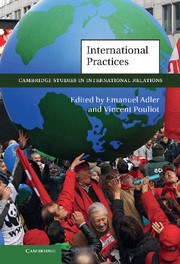Book contents
13 - Practices of theory
from Part V - Conclusion
Published online by Cambridge University Press: 05 June 2012
Summary
Introduction:
Practice makes perfect, or so the adage has it. But does that principle apply to the scholarly practices of theorizing international politics? Will the practice of centering practices as objects of analysis lead to an improved (if still imperfect) theoretic account? Will it better enable the practitioners of the discipline of International Relations (IR) to engage in productive intertheoretic or interparadigmatic dialogue and, in doing so, to transcend the oft-invoked binaries of material vs. ideational perspectives and agential vs. structural emphases? The contributors to this volume maintain that it will: if IR scholars were regularly to focus attention on “social doing” – on grounding theory in social–political life as it is performed in competent performances – they would be better able to converse across substantive domains, theoretic perspectives, and methodological approaches.
We respond as sympathetic critics. Specifically, we endorse the argument that a focus on practices holds appreciable potential as a conceptual framework for the analysis of the empirics of international politics. Placing practices at the center of analysis, making them a “conceptual focal point,” we agree, should aid and enrich researchers’ efforts to grasp the complexities of international social–political life, while also providing the basis for theoretically fruitful conversations that bridge the many divides that afflict the IR field. Focusing on practices, and the background knowledge that they embody, and through which they are socially meaningful, holds the potential to foster serious engagement between realists and liberals, for example, over the conditions of possibility for and limitations on stable patterns of cooperation among agents of state, as well as the production of interstate enmities. Rather than recapitulating meta-theoretic assumptions about the determinative (or plastic) role of anarchy – whether or not it is what states make of it – or conversely about the world-order-making role of transgovernmental networks and global civil society in addressing such core questions of the discipline, IR scholars’ turn to practices – asking what is being done in producing interstate harmonies and/or enmities, what competent performances are involved – should go a long way toward bridging paradigmatic divides. Similarly, the agent-centered analyses of many constructivists and the intertextual focus of some poststructuralists could reach a point of productive conversation about the materialization of discourse in practices of normalization of international social life. We believe and we hope that the partisans of the “isms” of the discipline can effectively mute much of the currently sterile war of scholarly position by turning away from the defense of respective meta-theoretic foundations and toward empirical attention to the “doing” of international politics. Accordingly, we commend the editors of and the contributors to this volume for providing systematic exemplification of a framework for focusing on practices.
- Type
- Chapter
- Information
- International Practices , pp. 335 - 354Publisher: Cambridge University PressPrint publication year: 2011
References
- 32
- Cited by

